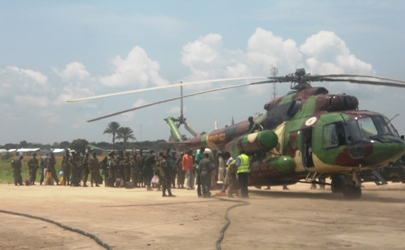South Sudan army suspends disarmament operation in Pibor to hunt rebels
October 30, 2012 (JUBA) – South Sudan has decided to cease conducting civilian disarmament operation activities in Jonglei’s Pibor County, instructing the army to take “sweeping measures” to clear the area of rebels, multiple senior military officers and top-level government officials said on Tuesday.

Major General Butrous Bol Bol, told Sudan Tribune on Tuesday that the disarmament operation’s commander “has received instructions from the [SPLA] general headquarters to suspend the disarmament program in Pibor County. The reason for suspension is the existence of David Yauyau militia group in the area.”
Bol, who commands the SPLA’s division eight in Jonglei, responsible for provision and protection of lives and properties of citizens in the area, said that the move will allow the army to concentrate on its fight to contain rebel activities in the area.
The senior officer added that “a notification” alerting the local population about the SPLA’s has been issued so it does not cause “panic”.
“Local authorities, particularly the Pibor County Commissioner [Joshua Konyi Irer] has been informed. He will in turn pass this information to chiefs and the general population about it and now armed groups found in the area will have to explain themselves”, he said.
The general said that Pibor was becoming “a front-line” for rebel activities, calling on civilian population to cooperate with the army in providing information about rebel activities.
“Yauyau is not only fighting the army but also killing civilians. So he is actually becoming an enemy of the whole country. He has been attacking SPLA positions ever since he started his rebellion”, he said.
In April this year Yauyau rebelled for a second time having joined the SPLA in 2011 having originally taken up arms against South Sudan’s ruling party – the Sudan People’s Liberation Movement (SPLM) after elections – in April 2010 when, as an independent candidate, he lost his campaign to represent the Gumuruk–Boma constituency in Pibor County at the Jonglei State Assembly.
The SPLM candidate, Judy Jokongole, won the race by a wide margin according to electoral authorities. Before his failed election bid Yauyau studied theology in Southern Sudan and Kenya and then served as the Pibor County secretary of the South Sudan Relief and Rehabilitation Commission in Jonglei.
Yauyau hails from the Murle ethnic group, which is based in Pibor County where he carried out most of his activities during his first rebellion. A report from the Sudan Human Security Baseline Assessment (HSBA) of the Small Arms Survey said last year that Yauyau’s initial rebellion may have been more about internal Murle politics than electoral grievances.
The Murle, Luo Nuer, and Dinka as well as some other tribes in Jonglei were involved in series of raids and counter raids for cattle, bounty and revenge that escalated dramatically at the turn of the year, displacing over 100,000 people.
A disarmament campaign has been underway in Jonglei since mid-March involving 15,000 SPLA soldiers and police in an attempt to disarm the civilian population. In the past disarmament campaigns have entrenched the Murle’s disaffection with the SPLM and SPLA and their perception that they are marginalised at a national level, according to the a 2011 by the Small Arms Survey research group.
The report 2011 said: “Murle discontent and general insecurity in Pibor county have proved to be fertile ground for such a revolt, and the area is one where the SPLA has failed to assert and extend its authority, beyond the conduct of brutal disarmament campaigns that have served to stoke local discontent.”
At the time of Yauya’s second rebellion the SPLA’s spokesperson Philip Aguer said that the rebel group would have no meaningful effect on South Sudan, which gained independence from Sudan in July 2011.
Since independence in July 2011 Juba has repeatedly claimed that Khartoum backs southern rebels in an attempt to destabilise the young nation.
Unlike other figures who led insurrections after the 2010 elections Yauyau was a civilian and not a member of the army before his rebellion – although when he reconciled with Juba in 2011 he was given the position of General in the SPLA.
(ST)
